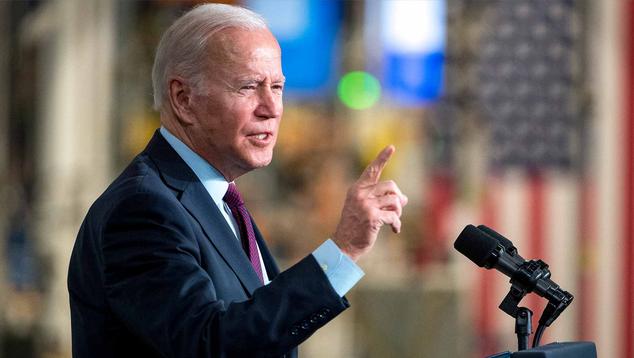President Joe Biden signed the new $1.2 trillion "Infrastructure Investment and Jobs Act" into law this week. From the American public's perspective, this is a big deal. I wrote about the public's desire to have more of their federal money spent on infrastructure as far back as 2016, saying at that point, "The general idea of spending more federal money on infrastructure … meets with strong public approval; 75% of Americans say they agree, while 11% disagree." By 2019, I wrote about what I called the "singular appeal of a government focus on infrastructure," and late last year, I was saying, "Infrastructure action should be a no-brainer."
The rationale behind these conclusions was straightforward. Every bit of research I have reviewed over the past five years shows overwhelming public support for the idea of spending federal tax dollars on infrastructure. The just-passed bill, although hotly debated and much revised, ends up serving as an excellent example of elected representatives, to some extent across the partisan aisle, doing their constituents' bidding, albeit after many years of inaction.
Infrastructure Bill Joins Other Legislation, Past and Future
There's more such major spending legislation on the horizon. Congress is now working on the $1.85 trillion "Build Back Better" bill focusing on domestic social and climate initiatives. A scan of existing survey research indicates that this bill too is supported by the majority of Americans. A recent Washington Post/ABC News poll found 58% support for a bill described as "the federal government spending about $2 trillion to address climate change and to create or expand preschool, healthcare and other social programs." And, when elements of the bill were listed separately in a recent Yahoo News/YouGov poll, eight received clear majority approval; three had support at about the 50% level; only two were significantly below the majority support level.
These two recent bills come in the wake of the similarly popular $1.9 trillion American Rescue Plan COVID relief bill, which Biden signed into law in March. A Gallup poll in March 2021 found 63% support for the bill, a finding echoed across a wide variety of other polls.
Biden Administration Hopes for Credit for Popular Legislation
The relatively high levels of support for these major pieces of legislation have not escaped the attention of the White House. Biden's Press Secretary Jen Psaki on Monday said, "The president's agenda is quite popular," and that "The American Rescue Plan [and] the infrastructure deal are some of the most popular pieces of legislation in the last 20 years. The Bipartisan Infrastructure Deal and the Build Back Better Agenda are very popular."
Psaki was talking up these bills in her press briefing in response to a reporter who asked for her reaction to the disconnect between polling showing the popularity of these bills and Biden's low overall job approval ratings. The reporter was referring specifically to a new Washington Post/ABC News poll showing Biden's rating at 41%, similar to Gallup's just-released November update showing Biden at 42% approval, the same as in October. (Other recent polls show even lower approval ratings). In short, the question of the moment is why Biden's legislative achievements haven't translated into a bump in his approval ratings.
One answer to that question is that it may take the tincture of time for Biden's approval rating to reflect the success of getting a new infrastructure law passed, and even longer for its effects to begin to percolate through to the local level. There are, however, other possible explanations.
New York Times columnist Thomas Edsall made an interesting attempt to compile these explanations in a recently published column with the dramatic headline, "Democrats Shouldn't Panic. They Should Go Into Shock." Edsall asked a number of academics and pollsters to opine on the implications of Biden's low approval rating and concomitantly negative forecasts for Democratic losses in next year's midterm elections. What struck me was the wide variation of explanations these experts provided for Biden's low approval rating -- explanations that included his handling of Afghanistan, the COVID situation, worries about the economy and inflation, worries about immigration, and others.
We do know Americans tended to approve of the U.S. withdrawal from Afghanistan, although support varied, depending on the timing and wording of polling on the topic. Americans, however, clearly disapproved of how Biden handled the situation, so this would appear to be a plausible factor behind Biden's approval drop. In terms of COVID, the evidence is less straightforward, given that Americans' views about the trajectory of the pandemic are improving, and Biden gets his highest issue approval rating on his handling of the coronavirus.
This latter data point comes from Gallup's November update of Biden's approval ratings on his handling of six specific issues. Two of these issue approvals are above his overall average of 42%: 49% approval for his handling of the coronavirus response and 44% for his handling of healthcare policy. The other four are below his overall average: crime (39% approval), foreign affairs (38%), the economy (38%) and immigration (31%). Taking these as indicators, we would say Biden is suffering most based on his handling of immigration, the economy and foreign affairs.
Biden's low rating on handling the economy, as I've noted previously, goes along with Americans' quite low perceptions of the current status and direction of the U.S. economy in recent months. Yet the job market is hot; unemployment and jobless claims are down; the public's belief that now is a good time to find a quality job is at an all-time high; and the stock market is booming. Projections for Christmas holiday spending are at least as high as last year's, and Gallup's latest update will show an even rosier picture. On the other hand, prices for gas and other consumer goods are up significantly, and Americans hear a lot about supply chain issues (although these may not be as bad as originally thought).
There are still other factors, including the public's views of the physical and mental status of the president, whose 79th birthday is Nov. 20. Pew polling in September found less than half of Americans perceived Biden as being "mentally sharp," and other polling shows Americans are split when asked if Biden is physically and mentally fit.
There is also the possible impact of conservatives' highly visible pushback on progressives' identity politics agenda, including the focus on what is taught in schools and such things as critical reaction to the American Medical Association's publication of a complex, didactic 54-page guidebook on using appropriate words and language to promote health equity. The exact impact of all of this on views of Biden (and the Democratic Party) is difficult to ascertain.
Bottom Line
Biden's current approval ratings, although down significantly from his initial honeymoon period earlier this year, are not in unprecedented territory. Ronald Reagan bottomed out with a 35% approval rating in January 1983; Bill Clinton had a 37% rating in June 1993; and Barack Obama had 38% ratings in Gallup's Daily tracking in August and October 2011 and in September 2014. Each of these presidents' parties suffered losses in their second-year midterm elections. In the long term, however, all three presidents recovered, and each was reelected to a second term. On the other hand, Donald Trump had a 35% approval rating several times in 2017 and lost his bid for reelection. In short, history suggests that Biden's standing in the eyes of the American public could certainly improve in the months ahead, although history also tells us any prognostication is tenuous at best.




